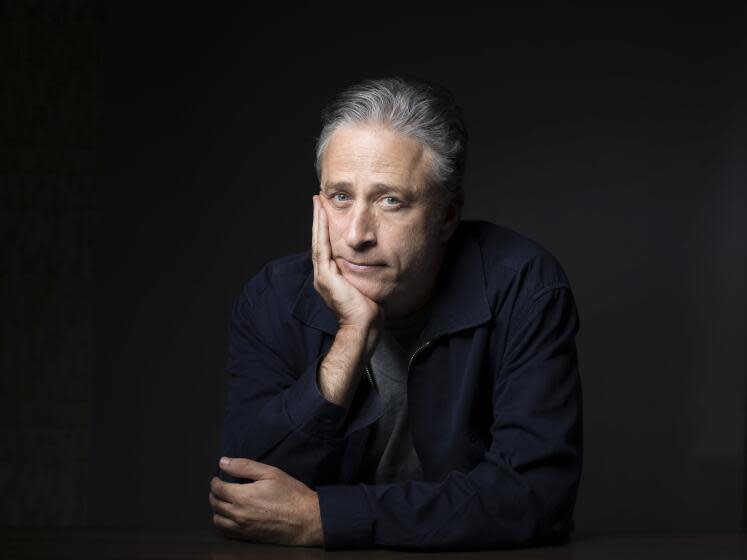Jon Stewart to return as (part-time) host of 'The Daily Show' through 2024 election

Jon Stewart is returning to his roots.
The comedian will host "The Daily Show" on Monday nights beginning Feb. 12 and continuing through the 2024 election cycle, Comedy Central announced Wednesday. Stewart will also resume his role as executive producer on the show and is committed through 2025.
Other members of "The Daily Show" news team will host on the remaining nights of the week. Episodes will air on Comedy Central and be available to stream on Paramount+ the next day.
“Jon Stewart is the voice of our generation, and we are honored to have him return to Comedy Central’s 'The Daily Show' to help us all make sense of the insanity and division roiling the country as we enter the election season," said Chris McCarthy, president and chief executive of Showtime/MTV Entertainment Studios. “In our age of staggering hypocrisy and performative politics, Jon is the perfect person to puncture the empty rhetoric and provide much-needed clarity with his brilliant wit."
Stewart's return, even on a part-time basis, is a major win for Comedy Central and its signature late-night program — and will be cheered by many liberal-leaning viewers who see the host as an essential voice in American politics, not merely a comedian. It coincides with what is sure to be a contentious presidential election year featuring a likely rematch between President Biden and former President Trump, with vital stakes for American democracy at a time of declining trust in traditional news sources.
The news comes a few months after the abrupt cancellation of Stewart's Apple TV+ talk show, "The Problem with Jon Stewart," and more than a year after his successor, Trevor Noah, stepped down, leaving "The Daily Show" in a protracted state of limbo. Throughout 2023, the show cycled through a list of celebrity guests hosts, including Leslie Jones and Kal Penn, while the quest for a permanent replacement remained elusive.
Former correspondent Hasan Minhaj appeared to be a front-runner for the job until a report in the New Yorker questioned the accuracy of stories he told in his stand-up, which the comedian has continued to defend. Roy Wood Jr., a longtime correspondent who was also viewed as a leading contender, announced in October that he would be leaving the show. Frustration about the lack of a succession plan became apparent at the Emmys last week, where "The Daily Show With Trevor Noah" won the award for talk series — and where Wood could be seen mouthing the words "Please hire a host" on stage.
Read more: 'The Daily Show With Trevor Noah' nabbed Emmy for talk series, ending John Oliver's long-held streak
Stewart took over as host and executive producer of the Comedy Central program in 1999, and helped give it a more sharply topical focus. Beginning with the chaotic 2000 presidential election, through the Sept. 11, 2001, terrorist attacks, the Iraq war and the rise of the tea party, "The Daily Show" became a must-watch source for political and media commentary. Stewart became known for his pointed critiques of conservative media, particularly Fox News, and for his in-depth interviews with politicians and other newsmakers. During his tenure, "The Daily Show" also became a pipeline for comedy talent, helping advance the careers of John Oliver, Stephen Colbert, Steve Carell, Samantha Bee, Jessica Williams and others.
Stewart departed the show in 2015, just as Trump began his ascent to the White House. After a deal with HBO that was ultimately unfruitful, Stewart created "The Problem With Jon Stewart," which premiered in 2021, but was canceled in October 2023. He also continued to advocate for medical benefits for 9/11 first responders, a cause he also championed while on "The Daily Show."
Since Stewart signed off almost nine years ago, the late-night landscape has transformed dramatically with a period of expansion followed by painful contraction. Political comedy boomed during the Trump presidency with shows such as "Full Frontal with Samantha Bee" and "Patriot Act with Hasan Minhaj" giving voice to the frustrations of many viewers. The rising number of shows offered greater opportunity for women and people of color — long shut out of late-night comedy — as writers and hosts.
But the rise of streaming services and on-demand viewing also made it tough for new shows to break through and led to new sources of creative tension — factors Stewart is no doubt aware of. "The Problem," which featured hourlong, in-depth episodes about a single subject, was critically well-received but did not stir regular conversation the way that "The Daily Show" once did. Stewart and his producers reportedly chose to walk away from the series over creative differences with Apple over coverage of sensitive issues such as China and artificial intelligence.
This story originally appeared in Los Angeles Times.
